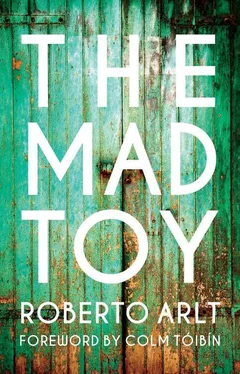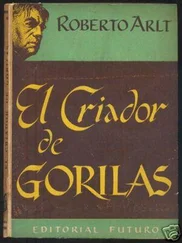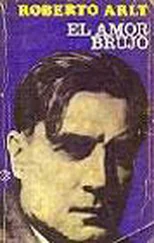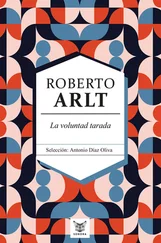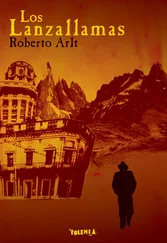‘What an idler!’
If I went to see him, then he would leave off talking to the women of his stable and, taking me by the arm would start off by saying:
‘Give me a gasper, eh…’ and we would walk up to the line of carts, get up into the one that had the best canopy and sit down for a long chat.
He’d say:
‘Hey, I really got one over on Salomon the Turk. He forgot a leg of lamb in his cart, so I called Little Guy’ — one of his protégés — ‘and said to him: “Get this up to the room, chop-chop”.’
He’d say:
‘The other day an old woman showed up. She wanted to move some stuff, nothing to it… And I didn’t have nothing, nothing at all… It’ll be a peso, I say to her and grab the fishmonger’s cart. Oh, I let the horse have it! When I got back it was nine fifteen and the nag was sweating so much I got frightened. I tied her up and dried her off, but the spic must have realised something because yesterday and today he’s come a bunch of times to see if the cart was there. Next time I’ll have to use the tripe-woman’s horse.’ When he saw my smile, he added:
‘You’ve got to earn a living, che , think about it: ten pesos for the room, Sunday I put a three-way down on His Majesty, Vasquito and Blessed… and His Majesty let me down royally.’ But just then he saw two tramps who were sneaking round the back of a cart at the end of the row, and he shouted after them at the top of his voice:
‘Hey, motherfuckers, what the fuck you doing over there?’ And brandishing the riding crop above his head he ran to the cart. After checking the harnesses carefully he came back grumbling:
‘I’m really fixed up if they steal a backboard or some reins.’
On rainy days I was accustomed to spend mornings with him.
Under a cart’s cover, The Crip would improvise amazing armchairs out of bags and boxes. You could tell where he was because clouds of smoke would come out of the arc of the cart’s hood. For fun, The Crip would hold the handle of his crop as if it were a guitar, half-close his eyes, suck the cigarette with vigour and with a horrible voice that was sometimes swollen with anger and at others painfully lusty, he would sing:
I’ve got an extra bedroom, mack ,
where it’s always time for fun
and that I rented out to her
and that I rented out to her
so she could grind for herself.
With his hat over one ear, the cigarette burning right under his nostrils, and his shirt half open to his suntanned chest, The Crip really looked the part of a thief, and sometimes he’d say to me:
‘Ain’t it the case, Blondy, that I look just like a finger-man?’
Or else he would tell me in a low voice, in a cloud of cigarette smoke, stories from the slum where he was brought up, his childhood in Caballito.
They were memories of assaults and rapes, daylight robbery, and the names of Garlic Head, the Englishman and the two Arévalo brothers were always cropping up in his stories.
The Crip would say with melancholy:
‘Yes, I remember! I was just a kid. They were always on the corner of Méndez de Andés and Bella Vista, leaning on the window of this Spaniard’s grocery shop. He wasn’t what you’d call a brain, this spic. His wife slept around and he had two daughters on the game. Yes, I remember! They were always there, taking the sun and making fun of the guys as came past. Some farmhands from the sticks would come past and one of the Arévalos would say: “Who ate all the pies?” And then his brother would say: “One of these guys.” Yes, they were really funny! And if you got at all pissed off, they’d let you have it. I remember. It was one o’clock in the morning. This Turk comes along. I was with a girl in this dive some French guy owned just across from the bar. It all happened at once, like. This Turkish guy’s hat flies into the middle of the street, he tries to pull out his gun, and then bam! The Englishman knocks him down with one punch. Arévalo gets his bag and Garlic Head gets the wallet. When the fuzz turned up, there was just the hat and the Turk, who was crying with his nose smeared across his face. The older Arévalo was the worst. He was tall, dark and blind in one eye. He had some dead people to his name. The last one he got was a corporal. There was a warrant out for him already. They got him one night along with lots of other guys in the pimping business in a café that there used to be in San Eduardo. They searched him and he didn’t have any weapons on him. A corporal puts the cuffs on him and leads him off. Before they got to Bogotá Street, in the darkness, Arévalo whips out a flick-knife that he’s got hidden under his shirt, and wrapped up in tissue paper, and he sticks it in this guy’s heart right up to the handle. The corporal falls down dead and Arévalo beats it; he went to hide in his sister’s house, she took in ironing, but they got him the next day. They say he died of consumption, caused by being beaten so much with the “rubber”.’
The Crip’s stories were all like this, monotonous, dark and bloody. If he finished talking before it was time for the fair to shut up shop, The Crip would invite me to go with him:
‘Hey, Blondy, what you say we go and gather some scraps?’
‘Okay.’
With his bag over his shoulder, The Crip would go from counter to counter and stallholder to stallholder, and without needing to ask they’d shout out:
‘Hey, Crip, take this.’ He’d collect fat, greasy bones; from the vegetable sellers he’d get potatoes or onions from the ones who didn’t give him cabbage; the egg sellers would give him some butter, the tripe sellers a bit of liver, and The Crip would, with his hat over one ear and his riding crop over his shoulder, the bag in his hand, walk before the vendors like a king, and even the greediest and most disgusting of them didn’t dare refuse him anything, because they knew that he could harm them in various ways.
When he’d finished, he’d say:
‘Come and eat with me.’
‘No, they’re waiting for me at home.’
‘Come on, don’t be a sucker, we’ll have steak and fried potatoes. And then you can play the viola and there’s wine, San Juan wine that does its job real fast. I bought a demijohn, because if you don’t spend your cash then the horses always eat it.’
I knew why The Crip insisted on my having lunch with him. He needed to ask me about his inventions — yes, it’s true — for all his slackness The Crip had a yen to be an inventor; The Crip, who by his own account had grown up ‘with the horses, under their hooves’, spent the siesta hour developing mechanisms and inventions to help him separate his fellow man from his money. I remember that one day, when I explained the marvels of electroplating to him, The Crip was so impressed that for several days afterwards he tried to persuade me to go into business with him counterfeiting money. When I asked him where he’d get the money from to set the business up, he said:
‘I know a guy who’s got money. If you want I’ll introduce you and we’ll sort something out. So… we going or not?’
‘Okay.’
Suddenly The Crip would stare around him, then shout out in a disconcertingly loud voice:
‘Little Guy!’
Little Guy, who was fighting with some other kids of his type, reappeared.
He wasn’t yet ten years old, and he was less than four feet tall, but misery and all the experience of homelessness had carved indelible wrinkles into his rhomboidal Mongol face.
His nose was snub, his lips were puffy, and he had a huge amount of hair, so woolly and curly that his ears disappeared into its shaggy depths. This picture of dirty aboriginality was completed by trousers that only reached as far as his ankles, and a Basque milkman’s black blouse.
Читать дальше
